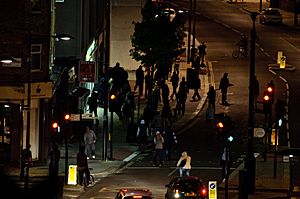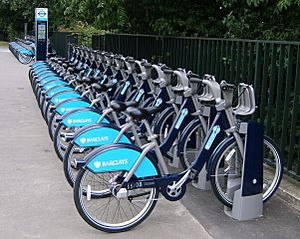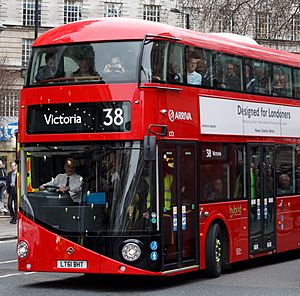Mayoralty of Boris Johnson facts for kids
Quick facts for kids 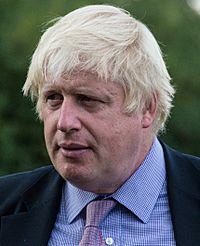 |
|
| 3 May 2008 – 9 May 2016 | |
| Party | Conservative |
|---|---|
| Election | 2008 and 2012 |
|
← Ken Livingstone • Sadiq Khan →
|
|
Boris Johnson was the Mayor of London from 2008 to 2016. He was elected in 2008 and then re-elected in 2012. During his time as mayor, he helped prepare London for the 2012 Summer Olympics. He also introduced the cycle hire scheme and the New Routemaster buses. Johnson also worked on the Thames cable car project. He banned alcohol on most of London's public transport.
Johnson was chosen as the Conservative candidate for the 2008 London mayoral election. He won against the Labour mayor, Ken Livingstone. Johnson then left his job as a Member of Parliament (MP) for Henley. In his first term, he banned alcohol on public transport. He also brought in the new buses and the bike hire scheme. He supported London's financial businesses. In 2012, he won the election again, beating Livingstone. During his second term, he oversaw the 2012 Summer Olympics. In 2015, he was elected as an MP again for Uxbridge and South Ruislip. He left his mayor role in 2016. Sadiq Khan from the Labour Party became the new mayor.
When Johnson left office, many Londoners still liked him. About 52% thought he did a "good job" as mayor. Only 29% thought he did a "bad job." After being mayor, Johnson became a key figure in the campaign for the UK to leave the European Union. This was called Brexit. He later became Foreign Secretary and then Prime Minister of the United Kingdom.
Contents
Becoming Mayor of London
The 2008 Election Campaign
In July 2007, Boris Johnson announced he wanted to be the Conservative candidate for Mayor of London. He was chosen in September after getting 79% of the votes in a public election.
Johnson's campaign focused on reducing crime among young people. He also wanted to make public transport safer. He promised to replace the old bendy buses with new ones. His campaign aimed at areas outside central London. It suggested that the current mayor had not paid enough attention to these areas. Johnson's campaign highlighted his popularity. Even people who disagreed with his ideas often found him funny. The campaign of the current mayor, Ken Livingstone, tried to show Johnson as out of touch. Johnson said his past comments were jokes taken out of context.
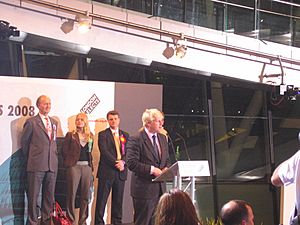
In the election, Johnson received 43% of the first votes. Livingstone received 37%. After counting second-choice votes, Johnson won with 53% to Livingstone's 47%. Johnson then resigned as an MP.
First Term as Mayor (2008-2012)
Johnson officially became mayor on May 3, 2008. His first public event was at a Sikh festival in Trafalgar Square. He faced some criticism early on. This was because he was late for two events and went on holiday after three weeks.
Johnson built his team over six months. He removed staff who were too close to the previous mayor. He appointed Tim Parker as his first Deputy Mayor. But Johnson later dismissed Parker. This was because Parker tried to take too much control. Some in the Conservative Party were worried about Johnson's early administration.
Johnson did not make big changes to the mayor's system. But he did reverse some things the previous mayor had done. Johnson seemed to move to the left on some issues. For example, he supported the London Living Wage. He also appeared at London's gay pride parade. In 2012, he banned bus adverts from a Christian group. These adverts compared homosexuality to an illness.
Policing and Safety
Johnson became the head of the Metropolitan Police Authority. In 2008, he supported the resignation of Police Commissioner Ian Blair. This was after Blair faced criticism. Johnson was very supportive of the Metropolitan Police throughout his time as mayor. Crime in London generally decreased during his administration. However, his claim that serious youth crime had gone down was later found to be incorrect. He admitted his mistake.
Johnson was criticized for his response to the 2011 London riots. He was on holiday when the riots started. He did not return to London for 48 hours. He spoke to Londoners 60 hours after the riots began. When he visited affected areas, some people booed him.
Preparing for the 2012 Olympics
Three months after being elected, Johnson went to the 2008 Summer Olympics closing ceremony in Beijing. He received the Olympic Flag there. London had won the bid to host the 2012 Summer Olympics in 2005. This happened under the previous mayor, Livingstone. Johnson's job was to co-chair the Olympic board. This board oversaw the games. Johnson continued the preparations for the 2012 Olympics. Some people said he took credit for Livingstone's work.
Johnson also ordered a tall tower to be built in the Queen Elizabeth Olympic Park. This tower became known as the ArcelorMittal Orbit.
Working with Businesses and Media
Johnson strongly supported London's financial businesses. He criticized those who blamed bankers after the Financial crisis of 2007–2008. He also spoke out against the Occupy London movement in 2011. He spent a lot of time with people in financial services. He also raised money from wealthy people for a charity called the Mayor's Fund. This fund was set up to help young people.
Johnson also had many friends in the British media. This led to a lot of positive news coverage for his administration. He supported his media friends, like Rupert Murdoch, during the phone hacking scandal.
Transportation Changes
Johnson ended a deal where London exchanged transport knowledge for cheaper diesel fuel from Venezuela. This deal had helped provide cheaper bus fares for low-income residents.
He also stopped the half-yearly checks for black cabs. But this rule was brought back three years later. In 2008, Johnson announced a plan to invest in transport. This plan included cancelling the Thames Gateway Bridge.
Johnson removed the western part of the congestion charging zone. He also cancelled plans to increase the charge for large vehicles. He was later accused of not publishing a report on air pollution. This report showed that London had too much nitrogen dioxide.
Johnson kept projects started by Livingstone, like Crossrail. But he was accused of trying to take credit for them. He introduced a public bicycle scheme. This idea had been considered by Livingstone's team. People often called these "Boris Bikes." The system cost £140 million and lost money, but it was popular. Even though Johnson supported cycling, some groups said he did not make roads safer for cyclists. As he promised in his election, he also brought in the New Routemaster buses for central London. He also ordered the building of a cable car system. This cable car crosses the River Thames.
Johnson planned to extend the use of Oyster cards to national rail services in London. He had promised to keep Tube ticket offices open. This was against Livingstone's plan to close some offices. In July 2008, the Mayor's office announced that ticket offices would stay open. To pay for these projects, Johnson's administration borrowed £100 million. Public transport fares also increased by 50%.
Other Actions
Soon after becoming mayor, Johnson stopped publishing The Londoner newsletter.
Public Image
Johnson remained a popular figure in London. He had a strong celebrity status. In 2009, he helped a woman who was being threatened by teenagers while he was cycling.
Second Term as Mayor (2012-2016)
Re-election Campaign
Johnson ran for re-election in 2012. Before the election, Johnson published a book about Winston Churchill. Polls showed that Londoners trusted Johnson more on crime and the economy. But they preferred Livingstone's ideas for transport. In the 2012 Mayoral election, Johnson ran against Livingstone again. Johnson's campaign suggested Livingstone had avoided paying taxes. Livingstone called Johnson a "bare-faced liar." In 2012, Johnson was re-elected as mayor, beating Livingstone again.
Hosting the 2012 Summer Olympics
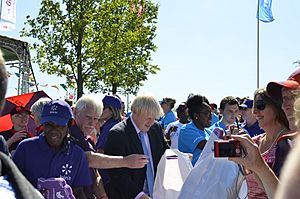
In July 2012, Mitt Romney, a US presidential candidate, said London was not ready for the Olympics. Johnson publicly criticized Romney for this comment.
At an event in Victoria Park before the games, Johnson got stuck on a zip line.
Before the Olympics, Johnson worked to improve transport in London. He made more tickets available and put on more buses. This was for the thousands of visitors coming to London.
After the 2012 Summer Olympic and 2012 Summer Paralympic Games, Johnson made a deal for West Ham United to use the Olympic Stadium. The stadium was renovated for this. A report in 2017 found that the £323 million cost of renovating the stadium would not be recovered. It also predicted the stadium would lose up to £20 million each year.
Transportation in Second Term
Johnson supported the idea of a Garden Bridge. This would have been a pedestrian bridge over the River Thames. It would have been built by private money. £43 million of public money was spent on this project. But the bridge was never built.
In 2008, Johnson had promised to keep ticket offices open on the London Underground. But on November 21, 2013, Transport for London announced that all London Underground ticket offices would close by 2015. This was to save money.
Night Tube service was planned to start in September 2015. But its launch was delayed. The service finally started in August 2016. This was several months after Johnson left office.
Other Activities
In 2014, Johnson promoted his book about Winston Churchill. Media often pointed out how Johnson compared himself to Churchill. Also in 2014, he was criticized for saying that "almost half" of his senior staff were women. London Assembly members said only four out of fourteen top jobs were held by women.
In 2015, Johnson criticized Donald Trump's comments about "no-go zones" in London. Trump had falsely said these areas were governed by shariah law and were unsafe for non-Muslims. Johnson said Trump was "unfit to hold the office of president." He also joked that he wouldn't want to expose Londoners to the risk of meeting Trump.
Johnson initially said he would not return to Parliament while still mayor. But in 2014, he decided to run for MP for Uxbridge and South Ruislip. He won in the May 2015 general election. So, for the last few months of his time as mayor, he was both mayor and an MP.
After Being Mayor
End of Mayoralty
Johnson did not run for a third term as Mayor of London. He stepped down on May 9, 2016. Sadiq Khan won the mayoral election and became the new mayor. Johnson was still popular when he left office. A poll showed that 52% of Londoners thought he did a "good job." Only 29% thought he did a "bad job." In 2016, Sadiq Khan announced that three German-made water cannons, which Johnson had bought for the police, would be sold. The vehicles could not be sold and were eventually scrapped in 2018. This resulted in a £300,000 loss.
Later Political Career
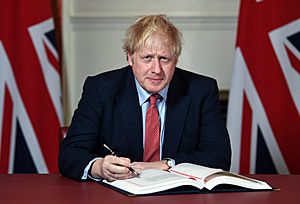
After being mayor, Johnson became a leading figure in the Vote Leave campaign. This campaign successfully pushed for the UK to leave the European Union in the 2016 referendum. Theresa May then made him Foreign Secretary. He resigned from this role two years later.
In 2019, Johnson was elected leader of the Conservative Party. He then became Prime Minister. Parliament approved his Brexit withdrawal agreement. The UK left the European Union on January 31, 2020. In March 2020, Johnson's government responded to the COVID-19 pandemic. They put in place emergency powers and lockdowns. They also approved a vaccination program.
Johnson announced his resignation as Prime Minister on July 7, 2022. He stayed in the role until September 6, 2022. Liz Truss then became Prime Minister.


